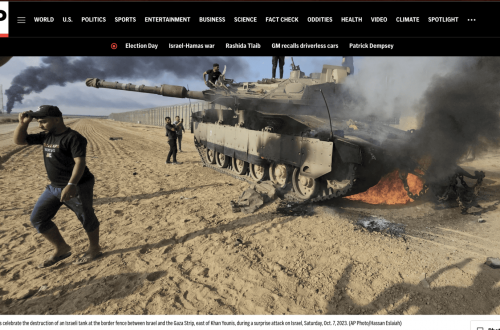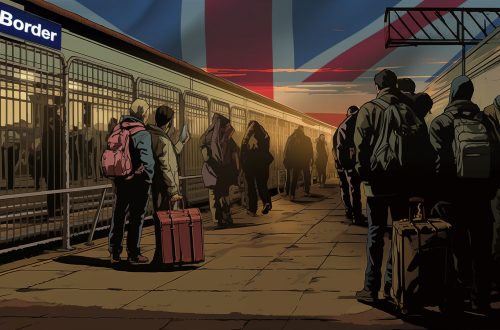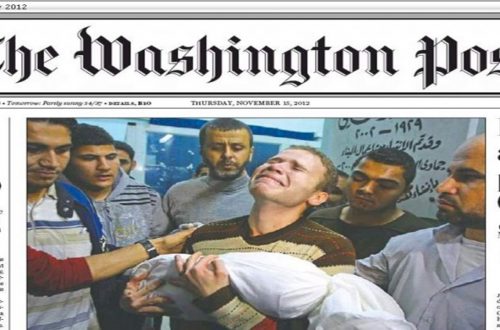Professor Alan Johnson works at Bicom and writes in a personal capacity.
There is no shortage of Palestinian heroes and heroines. When the Israeli novelist David Grossman journeyed among Israel’s national minority to write ‘Sleeping on a Wire: Conversations with Palestinians in Israel’ he found enough people ‘with whom one can build a country,’ enough for him to dream of ‘a real life for ourselves that contains spiritual space and expansive thinking and a place for us to discard some of our rusty armor.’
The 1,027 Palestinians who are coming out of prison today are mostly not people with whom one can build a country. And one of the worst who will walk free is Ahlam Tamimi, a female Hamas terrorist who played a leading role in the murder of 15 people (a 16thremains in a coma to this day) at a Sbarro pizzeria in Jewish west Jerusalem in August 2001.
Who is Ahlam Tamimi?
The Guardian’s Phoebe Greenwood offers us a broadly sympathetic portrait, drawn largely by Tamimi’s brother, Mohamed. She emerges as a young idealist tragically caught up in a world she did not really understand. We are told that she was targeted by Hamas while a student at Bir Zeit universityand only drove a car on the day. ‘Her involvement in the bombing came as a huge shock to her family,’ says Mohamed – ‘I don’t think she fully thought through what she was doing.’ We hear of his hope that his sister, now 31, will start a new life, ‘with political activism behind her’ and will soon be ‘in a white veil getting married.’
His main worry is how his poor sister will cope in exile in Jordan. ‘Deportation will be so painful for Ahlam. I don’t know how she will cope with being banished from the land she is so devoted to.”
The Guardian’s portrait of an idealistic nationalist, earnest if perhaps misguided, has caused great pain to the father of Malka Chana Roth, one of Tamimi’s victims. Frimet Roth has objected that the portrait of Tamimi is a wrong about her role in the atrocity, wrong about her being pressured into participation and wrong about her future intentions.
First, according to Roth, Ahlan Tamimi ‘was actually the planner and engineer of the attack’:
Contrary to what Phoebe Greenwoood writes from Ramallah, Ahlam Tamimi did not drive the Sbarro restaurant suicide bomber to his target. On the day of the massacre she personally transported a bomb weighing 10kg from a West Bank town into Jerusalem. The bomb was concealed inside a guitar case. She arranged for a taxi to bring her and an accomplice by the name of Al Masri, a young newly religious fanatic, to an Israeli security checkpoint. To reduce suspicion, they were dressed to look like Israelis. It worked. The bomb was not detected, and Tamimi led her “weapon” – Al Masri – to the target that had been carefully selected by her.
That target was a pizza restaurant, selected because it was located in the heart of Jerusalem and on a hot summer vacation afternoon it would be teeming with women and children. Tamimi instructed Al Masri to wait fifteen minutes before detonating the explosives to give her sufficient time to flee the scene safely.
Second Roth objects to ‘the contention, in Greenwood’s report, that Tamimi was pressured into committing this barbaric act,’ he argues, ‘is patently false.’
Since being sentenced to 16 life terms, she has been interviewed twice, once for a full-length documentary. She has repeatedly stated that she does not regret her actions. … Tamimi was also found guilty of a failed attempt at a terror attack several months before her “success”. On that occasion she planted a bomb in a wastebasket in a large Jerusalem supermarket. Fortunately, the bomb did not explode. Now, I ask you, are these the deeds and words of someone who simply “was a perfect target” for Hamas and who hadn’t “fully thought through what she was doing”, as her brother contends in the Guardian story?
Third, Roth doubts that this ideological zealot will now retreat to a private life.
I watched Israel’s Channel 2 News on Friday night. It showed Hamas terrorist Ahlam Tamimi being asked: “Do you feel sorry for what you did?” She answers her interviewer without a trace of hesitation: “No. Why should I feel sorry?” The interviewer persists: “Would you do it again if you had the chance?” Her unwavering response: “Yes.”
But maybe we are listening to a still-grieving parent who even now is understandably unbalanced by the murder of his 15-year-olddaughter? It seems not. The much-praised New York Times journalist Ethan Bronner thinks Tamimi was ‘a key figure in the pizzeria attack’ and he chimes with Roth.
“I’m not sorry for what I did,” she told an Israeli news organisation in 2006. “I will get out of prison, and I refuse to recognize Israel’s existence. Discussions will only take place after Israel recognizes that this is Islamic land.” … In a documentary on Palestinian prisoners, she was asked whether she knew how many children had been killed in the attack. She did not. When told the number was eight, she smiled.
Yet this smiling Tamini has been treated as a heroine.
She was given an award by Fatah and lauded as “the heroic prisoner.” The inscription reads, “A gift of the Fatah Palestinian National Liberation Movement, Ramallah – El-Bireh branch, To the heroic prisoner Ahlam Tamimi, As a token of esteem you’re your sacrifices and your acts of heroism.’
The Palestinian Authority TV Station paid homage to Tamimi on August 10, 2011:
‘”We, [at] the program In a Fighter’s Home, send best wishes of loyalty to Ahlam Tamimi. We wish her freedom – she and [the rest of] our glorious female prisoners. Special wishes to you, Ahlam, from the program In a Fighter’s Home and from the program team, from the home of the heroic fighter prisoner, Muhammad [Wael Daghlas]. You both belong to the same group.
David Grossman ended his book with a call for ‘truly daring thinking’ if Jewish and Arab Israelis are to create ‘a dynamic system of relations that will gradually release the partners in Israeliness from the mentality of conflict.’
Before Tamimi took her life, 15-year-old Malka Chana Roth was a volunteer at a youth camp organised by Etgarim, the Israeli Outdoor and Recreation Association for the Disabled. Her parents have since established a charity in her memory. www.kerenmalki.org helps young disabled kids stay at home, by providing specialist equipment and therapeutic services. And one in three of the beneficiaries are Israeli Arabs.
In sharp contrast, students at An-Najah University, unbelievably, recreated the atrocity at in a macabre exhibition to mark the first anniversary of the Palestinian intifada. According to a BBC report, ‘The room-sized installation had broken tables splattered with fake blood and body parts. A university branch of the militant Palestinian group Hamas built the exhibit, which recreates the scene of last month’s attack on Sbarro Pizza house in Jerusalem.’


